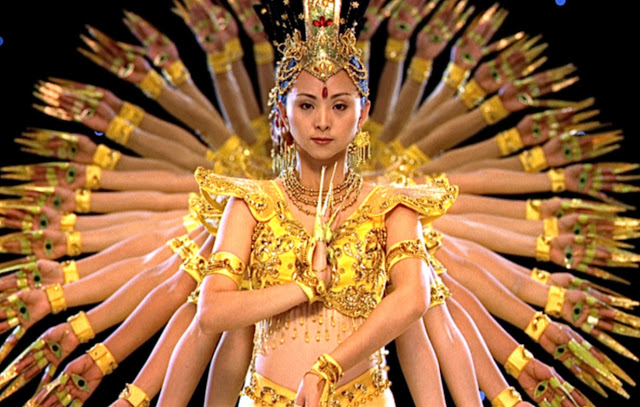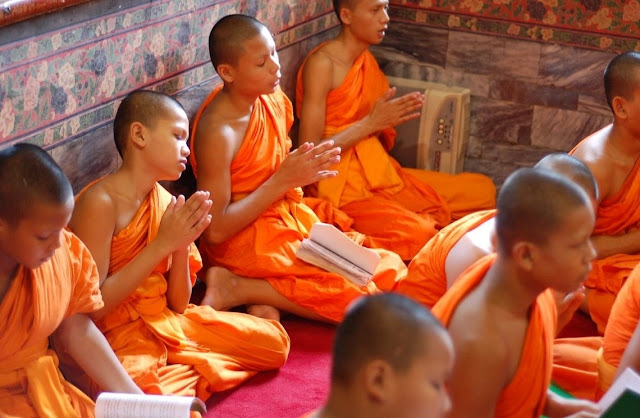Life and Death in Hinduism and Buddhist
https://phistars.blogspot.com/2012/12/life-and-death-in-hinduism-and-buddhist.html
Life and Death in Hinduism and Buddhist
Buddhism and Hinduism have very similar concepts of birth
and death. They only differ on the nature of the soul and what happens at the
moment of liberation. The thing that unites both conceptions is karma. Both
religions seem to think that both good and bad action keeps one in the cycle of
Samsara. In both, if one performs a good action it leads to a rebirth in a
higher status. A bad action leads to a rebirth a lower form, such as a monkey
or a bug. The method of escaping samsara is also different for both religions.
For the Hinduism, there are three paths for escaping samsara. These three paths where first stated in the Baghavad Gita. The first is through devotion. By offering devotion to a deity through its power they can achieve liberation. The second is through renunciation. In the last state of life, the ascetic, one has to detach oneself from all worldly desires in preparation for Moksha. In such a pure state of mind, one can finally escape Samsara. The last one is through dharma or duty. By one performing one's duty in society without expecting a reward, one can clear both positive and negative karma. Eventually, through the fulfillment of your duty, whether one is a Brahmin or a merchant one can achieve liberation.
For the Buddhist, one has to follow the four noble truths to achieve liberation. They must realize that all is suffering and that desire for permanence is the cause of it. One must extinguish the desire for permanence in order to escape the cycle of rebirth. They make a great emphasis on self effort. For the Buddhist, even the Gods are trapped in the cycle. They do not have the power to help you escape the cycle of samsara. This is the basic concept of liberation in Buddhism or Theravada Buddhism.
This concept changed a bit when Buddhism spread to other parts. Now beings know as Bodhisatvas could help you achieve liberation. They have stores of good karma that can help the Buddhist cancel out their negative karma. Through their worship, the practitioner can erase all his karma and achieve liberation. In another Mahayana conception of liberation, they state that the Bodhisatvas can take you to a "Pure Land". In this heaven like place, the Bodhisatvas can help you achieve liberation.
Aside from different paths to liberation, Buddhism and Hinduism differ on what it means to be "liberated". For the Hindus, liberation means the realization that one is no different than Brahma. When they attain Moksha, their ignorance is cured and then they sink back into the Brahma, the only being that truly exist. For them, existence separate from Brahma is an illusion. All is one complete sole, soul.
The Buddhist however, completely reject the conception of soul. For them, the soul is formed by five different components that disperse at death and then come together in a new life. Liberation or nivana means the blowing out of a candle. In this state, all the components of a soul never come together. They become no more. Thus, all suffering ceases to exist.
Thus, both religions have a different conception of life and death. However, both agree in the manner that karma drives the cycle of samsara. Although they differ in the manner of escaping this cycle, they come together in the desire to escape from the death and suffering of this impermanent world. In the end, all things come to pass. One only takes the karmic baggage to one next life. Thus, concerning oneself for material wealth and worldly pleasures in life is meaningless. Such fixation on materialism will only result on more births and more death filled with suffering. Both agree that it is better to focus on escaping the cycle.
For the Hinduism, there are three paths for escaping samsara. These three paths where first stated in the Baghavad Gita. The first is through devotion. By offering devotion to a deity through its power they can achieve liberation. The second is through renunciation. In the last state of life, the ascetic, one has to detach oneself from all worldly desires in preparation for Moksha. In such a pure state of mind, one can finally escape Samsara. The last one is through dharma or duty. By one performing one's duty in society without expecting a reward, one can clear both positive and negative karma. Eventually, through the fulfillment of your duty, whether one is a Brahmin or a merchant one can achieve liberation.
For the Buddhist, one has to follow the four noble truths to achieve liberation. They must realize that all is suffering and that desire for permanence is the cause of it. One must extinguish the desire for permanence in order to escape the cycle of rebirth. They make a great emphasis on self effort. For the Buddhist, even the Gods are trapped in the cycle. They do not have the power to help you escape the cycle of samsara. This is the basic concept of liberation in Buddhism or Theravada Buddhism.
This concept changed a bit when Buddhism spread to other parts. Now beings know as Bodhisatvas could help you achieve liberation. They have stores of good karma that can help the Buddhist cancel out their negative karma. Through their worship, the practitioner can erase all his karma and achieve liberation. In another Mahayana conception of liberation, they state that the Bodhisatvas can take you to a "Pure Land". In this heaven like place, the Bodhisatvas can help you achieve liberation.
Aside from different paths to liberation, Buddhism and Hinduism differ on what it means to be "liberated". For the Hindus, liberation means the realization that one is no different than Brahma. When they attain Moksha, their ignorance is cured and then they sink back into the Brahma, the only being that truly exist. For them, existence separate from Brahma is an illusion. All is one complete sole, soul.
The Buddhist however, completely reject the conception of soul. For them, the soul is formed by five different components that disperse at death and then come together in a new life. Liberation or nivana means the blowing out of a candle. In this state, all the components of a soul never come together. They become no more. Thus, all suffering ceases to exist.
Thus, both religions have a different conception of life and death. However, both agree in the manner that karma drives the cycle of samsara. Although they differ in the manner of escaping this cycle, they come together in the desire to escape from the death and suffering of this impermanent world. In the end, all things come to pass. One only takes the karmic baggage to one next life. Thus, concerning oneself for material wealth and worldly pleasures in life is meaningless. Such fixation on materialism will only result on more births and more death filled with suffering. Both agree that it is better to focus on escaping the cycle.





